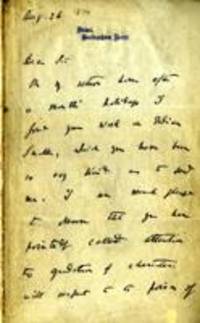- Browse Repository
- College of Arts & Sciences
- CWRU Dittrick Medical History Center
- ca. 1880 (x)
- Robert M. Stecher Collection of Darwiniana
Robert M. Stecher Collection of Darwiniana
Show moreDarwin recommends H. Müller’s Die Befruchtung der Blumen (1873) Transcription: " A.W. Bennett Esq 3. Park Village East Regent Park London N.W. If you have not already seen, D.H. Muller Die Befunckling die [] []" Leipzig 1873 is evident [], I think it shd be worth your []. [] May 5" 1873 C. Darwin" Postcard sent from Down, Beckenham, Kent, England
The Robert M. Stecher Collection of Charles Darwin Books and Manuscripts
Show less
Show moreTranscription: "My dear Prof. Sedgwick You must let me thank you in my wife’s & own name for your most kind note. My wife never dreamed that you would trouble yourself in answering her, otherwise she would have scrupled in calling your attention to the case. All that she expected was, that if your votes had been disengaged you would consider the case. I am very sorry to hear so poor an account of your health. I should much like to attend at Aberdeen, but I am utterly unfit for so great an exertion. I am told that I suffer from suppressed gout! Whatever it is, I am made wretched & almost useless. I am pleased that you remember my attending you in your excursion in 1831. To me, it was a memorable event in my life; I felt it a great honour, & it stimulated me to work, & made me appreciate the noble science of geology. Believe me that I thank you sincerely for your kind expressions towards me. With entire respect & honour, I remain, Yours sincerely obliged, Charles Darwin" Letter sent from Down, Bromley, Kent, England. Envelope included.
The Robert M. Stecher Collection of Charles Darwin Books and Manuscripts
Show less
Show moreLetter to Alfred Neafie concerning a Christmas gift of a silver knife, and a brief discussion of theory. Transcription: "England, Dec.23;1872 Col Alfred Neafri: My dear Sir: While it gives me much pleasure to hear that you are a convert to my theories, I am in constant terror and anxiety, sir, lest you showed retrograde to your original condition. For, my dear sir, I have heard,(and I say this not in anger but in sorrow of heart,) that you are quite given to "growls" about things in general and some alas in []. Now, Col, if you have read my books all week, you must know that nothing is more indicative of a savage slate than growling. And in my anxiety and distress, lest you should furnish a case of entire reversion, I have counseled your wife to present you this silver fruit knife for your Chistmas Gift. [] Chat if your semi savage slate should increase upon you. This timely and appropriate gift may incline you to use your hands, and thus keep out of sight the claws that generally are well developed in growling animals. It is fair, my dear sid, to assure you that your wife is not privy to these fears of mine, but gives this knife to you because she believes it in a measure [] holical of your wedded union-strong but not sharp: solid but not heavy: both useful and ornamental, brilliant and precious. I am, dear sir, with the Compliments of the Season your true friend Charles Darwin Col. Alfred Neafir Ellenville [] N.Y. U.S. America Darwin A Darwin Letter 1872 Purchased 1946 Was laid in "Animals+Plants under Domestication" Am. ed" Letter, signed by sender [written for Charles Darwin?]. Envelope included. Sent from Ellenville, Ulster County, New York.
The Robert M. Stecher Collection of Charles Darwin Books and Manuscripts
Show less
Show moreDarwin authorises publication of a Bohemian edition of Origin. Transcription: "March 13. 1878 Dear Sir, I have much pleasure in authorizing your publication of a Bohemian edition of my 'Origin of Species'. The Russion translation was published by Kowalewsky of St Petersburg. I believe he has resided in Germany for many years + I have no idea where he is at present. I hope you received the former letter written by my son in reply to your question as to the most recent edit of the Origin? dear Sir yours faithfully Charles Darwin P.S. In case the former letter miscarried I may mention that the 6th is the last edit of the Origin; the 2nd is the last of the Descent of Man To Dr A. Stecker Jungbunzhau" Letter sent from Down, Beckenham, Kent, England.
The Robert M. Stecher Collection of Charles Darwin Books and Manuscripts
Show less
Show moreDarwin writes to say thank you for A. E. Brehm’s Thierleben [2d ed. (1876)]. Transcription: "Aug 28 1876 Gentlemen I am very much obliged for your kind present of the new edition of Brahm's Thier Leben, The illustrations are admirable; but it wd be superfluous in me to [] any opinion on their work, as I have plainly shown in my Descent of Man how much I have profited by it, + how -much I value it. With my best Thanks I remain Gentlemen your obliged servant Charles Darwin" Letter sent from Down, Beckenham, Kent, England
The Robert M. Stecher Collection of Charles Darwin Books and Manuscripts
Show less
Show moreTranscription: "My dear Sir I see by the Annals. of Nat. History, you have changed your abode; I further see that the change has not at all induced a change in your Natural History pursuits. I write for the chance of your being able to assist me: I am investigating the slight powers of excavation which Verruca stümia /= Clisia striata) possesses; & I am am anxious to obtain specimens, either dry or wet, attached to rocks or other substances (excepting Laminariæ or seaweeds) non calcareous & some (almost equally valuable to me) on limestone rocks for comparison. The only very few specimens which I have hitherto seen on any rocks, came from Devonshire. Can you aid me? I believe you will kindly be willing to do so, if in your power. Pray believe me, My dear Sir Yours sincerely Charles Darwin Have you continued your interesting researches on the metamorphoses of the Cirripedia?" Letter sent from Down, Beckenham, Kent, England
The Robert M. Stecher Collection of Charles Darwin Books and Manuscripts
Show less
Show moreTranscription: "My dear Sir Last summer you gave me hopes that you would give me information with respect to your observations on Hollyhocks. Will you forgive me for reminding you, that I shd. be very glad to hear the result of any of your experiments. I very much wish I could persuade you to try some experiments on the relative fertility, or number of seed, of some crosses between the most distinct varieties. I have always wished & intended to try this myself, but I have so many “irons in the fire” that I know not when I shall have the time. Pray excuse me for venturing to trouble you & believe me Dear Sir Yours very faithfully Charles Darwin" Letter sent from Down, Beckenham, Kent, England
The Robert M. Stecher Collection of Charles Darwin Books and Manuscripts
Show less
Show moreTranscription: "My dear Sir I must thank you cordially for your note which has pleased me much. I did not think that any one wd have noticed the case of the Lathyrus, which interested me because I remember looking at it many years ago in a Lord Dundreary state of mind. It appears to me that we have looked at many things from the same point of view; at least I remember well when reading your capital paper on the great fir woods of Hampshire being surprised at your remarks on the presence of this or that weed shewing how exactly the same train of thoughts had often passed thro’ both our minds. I ought to have thanked you for sending me your photograph which I am extremely glad to possess. Pray believe me my dear Sir, Yours very faithfully, Ch. Darwin" Letter sent from Down, Beckenham, Kent, England. Envelope included
The Robert M. Stecher Collection of Charles Darwin Books and Manuscripts
Show less
Show moreTranscription: "Dear Sir I thank you sincerely for allowing me to insert your admirable sentence. I am much gratified by your kindness. At any future time I shall be delighted to answer any objections as far as lies in my power, or to receive any suggestions. I shall stay here at furthest only seven or eight days, & it is not improbable that I may be called home sooner, so that, though I should have had much pleasure in making Mr Foster’s acquaintance, it would not be at all worth his while coming here. Indeed during great part of day I am wandering on the hills, & trying to inhale health. Pray give my thanks to Mr Parker & say that I will remember his obliging offer should circumstances require me to make any remarks, which I hope may not be the case. With my renewed thanks, pray believe me, Dear Sir, Yours sincerely & obliged Charles Darwin" Letter sent from Ilkley Wells House, Otley, Yorkshire.
The Robert M. Stecher Collection of Charles Darwin Books and Manuscripts
Show less
Show moreTranscription: "My dear Mr Kingsley I thank you sincerely for your letter. I have been glad to hear about the Duke of Argyle, for ever since the Glasgow Brit. Assoc. when he was President, I have been his ardent admirer. What a fine thing it is to be a Duke: nobody but a Duke, the first time he geologised would have found a new formation; & the first time he botanised a new lichen to Britain. With respect to the pigeons, your remarks show me clearly (without seeing specimens, though I thank you for the kind offer) that the birds shot were the Stock Dove or C. Oenas, long confounded with the Cushat & Rock-pigeon. It is in some respects intermediate in appearance & habits; as it breeds in holes in trees & in rabbit-warrens. It is so far intermediate that it quite justifies what you say on all the forms being descendants of one. That is a grand & almost awful question on the genealogy of man to which you allude. It is not so awful & difficult to me, as it seems to be most, partly from familiarity & partly, I think, from having seen a good many Barbarians. I declare the thought, when I first saw in T. del Fuego a naked painted, shivering hideous savage, that my ancestors must have been somewhat similar beings, was at that time as revolting to me, nay more revolting than my present belief that an incomparably more remote ancestor was a hairy beast. Monkeys have downright good hearts, at least sometimes, as I could show, if I had space. I have long attended to this subject, & have materials for a curious essay on Human expression, & a little on the relation in mind of man to the lower animals. How I shd. be abused if I were to publish such an essay! I hope & rather expect that Sir C. Lyell will enter in his new Book on the relations of men & other animals; but I do not know what his recent intentions are. It is a very curious subject, that of the old myths; but you naturally with your classical & old-world knowledge lay more stress on such beliefs, than I do with all my profound ignorance. Very odd those accounts in India of the little hairy men! It is very true what you say about the higher races of men, when high enough, replacing & clearing off the lower races. In 500 years how the Anglo-saxon race will have spread & exterminated whole nations; & in consequence how much the Human race, viewed as a unit, will have risen in rank. Man is clearly an old-world, not an American, species; & if ever intermediate forms between him & unknown Quadrumana are found, I should expect they would be found in Tropical countries, probably islands. But what a chance if ever they are discovered: look at the French beds with the celts, & no fragment of a human bone. It is indeed, as you say absurd to expect a history of the early stages of man in prehistoric times. I hope that I have not wearied you with my scribbling & with many thanks for your letter, I remain with much respect, Yours sincerely, Charles Darwin As you seem to care for all departments of n. History, I send a pamphlet with a rather curious physiological case." Letter sent from Down, Bromley, Kent, England. Page missing.
The Robert M. Stecher Collection of Charles Darwin Books and Manuscripts
Show less
Show moreDarwin writes and tells Nevill he is familiar with cases of prepotency that are so strong that a cross has no effect. Transcription: "December 23. 1880 Down Beckenham, Kent Railway Station Orpington.S.E.R. Dear Lady Dorothy Nevill I thank you for your kindness in writing to me. I have heard of a good many [canes] of one bread being so [] over another, that to only seems to produce hardly any affect.-I do not think that I shall be in London for some time, [] whenever I am I will have the pleasure of calling on your Lordship + beg leave to remain yours vy faithfully Charles Darwin" Letter sent from Down, Beckenham, Kent, England.
The Robert M. Stecher Collection of Charles Darwin Books and Manuscripts
Show less
Show moreDarwin returns a Drosera, from which he cut a piece for microscopic examination. Utricularia montana just arrived. Transcription: "The Lady Dorothy Nevill Dangstein Petersfield. Sept 11th Down, Beckenham, Kent Dear Lady Dorothy Nevill I send this afternoon the [] to the [] packed up as carefully as we can, + I sincerely hope it may reach you safely. It has interested me in a high degree + differs in one important respect from any other species which I have seen. I hope that you will not consider me [] when I tell you that I [] off for [] examination, one lead in fact, one [] lead, + a portion of two old leaves. But I cut them from the middle so that they will hardly be verified. I beg leave to remain your ladyship Most truly obliged Charles Darwin" Letter sent from Down, Beckenham, Kent, England. Envelope included.
The Robert M. Stecher Collection of Charles Darwin Books and Manuscripts
Show less
Show moreDarwin writes and tells Nevill he has received Darlingtonia; cannot explain its fructification. Darwin also declines invitation. Transcription: "April 6th Down Beckenham, Kent. Railway Station Orpington.S.E.R. Dear Lady Dorothy Nevill I received the flowers of the [] which you were so kind as to order to be sent me this morning. It is a most [] flower, + I cannot pretend to understand its manner of []. I am vy much obliged for your kind invitation, which I regret it is impossible for me to accept. I remain yours Ladyship I [am] very obliged Charles Darwin" Letter sent from Down, Beckenham, Kent, England.
The Robert M. Stecher Collection of Charles Darwin Books and Manuscripts
Show less
Show moreDarwin thanks Nevill for references. The Apocyanaceae that catch Lepidoptera represent the most gratuitous case of cruelty in nature known to Darwin, since the captured butterfly is of no use to the plant. Transcription: "Jan 15-1877 Down, Beckenham, Kent. Railway Station Orpington.S.E.R. Dear Lady Dorothy Nevill I am much obliged for all the trouble which you have so kindly taken. One of your references relates to the [] catching Lepidoptera, + this is the most gratuitous case of cruelty known to me in a state of nature, for apparently such captures are of no care to the plant + assuredly not to the [] butterfly or moth. Your Ladyship I am very obliged Ch. Darwin" Letter sent from Down, Beckenham, Kent, England.
The Robert M. Stecher Collection of Charles Darwin Books and Manuscripts
Show less
Show moreTranscription: "Madam, I do not know how sufficiently to thank your Ladyship for your singularly kind note & the magnificent present of Orchids. I should have much enjoyed accepting your Ladyships permission to see your famous collection of Orchids; but my health is far from strong & the journey would be very fatiguing to me. The Orchids have interested me extremely & some of them have been most useful; but they were unfortunately rather too dry. If I might venture to ask your Ladyship I hope you will thank your gardener for sending me so clear a list of names. Only one of the sorts arrived too withered for examination (for my object) viz the Bolbophyllum. If your Ladyship could spare me one more spike, with a few unopened flowers on it, & have the kindness to direct it to have a little damp moss tied round the cut end & sent by post (in tin Box or cannister if possible), it would be of great use for my work. Some of the species, as your Ladyship knows, of Bolbophyllum have the little lip or Labellum within the flower irritable, so as to move when touched; I shd. be very truly obliged if your Ladyship could have this point ascertained, that is if you can send me one more spike. If I understand your Ladyship’s note, there is no chance of your being enabled to send me a Mormodes or Cycnoches, in the course of a few weeks. I believe that your Ladyship understands the natural enthusiasm of a naturalist over his subject, & to this alone I can trust for your Ladyship to excuse the length to which this note has run. With the most sincere thanks, I beg leave to remain your Ladyships, Very truly obliged, Charles Darwin I will take the liberty of doing myself the pleasure of sending to you a copy of my little book on Orchids when published. If a single flower of Mormodes or Cycnoches should open & your Ladyship could send it; it would be necessary that it should be tied down to bottom of Box or basket, so that not even an atom of moss should fall on the irritable top of column; & damp moss should be tied closely round the cut end. These genera would be a priceless treasure to me." Letter sent from Down, Bromley, Kent, England.
The Robert M. Stecher Collection of Charles Darwin Books and Manuscripts
Show less
Show moreDarwin writes to that MacKintosh may show his letter [to the Royal Society]. He is also pleased that his old paper should have stimulated DM to such excellent work. Transcription: "Oct 16. 79 Dear Sir, You are quite welcome to show my letter to the secretaries, as it gives my deliberate conviction; but I beg you to say that it was written without the least notion that any one would see it except yourself, so probably it is badly expressed. It has pleased me much that my old paper should have stimulated you to such excellent work. If in any future papers you use the expression of overshot loads, I think you ought to explain your meaning rather more fully, for I failed to feel sure about it. I remain, dear Sir, yours faithfully Charles Darwin" Letter sent from Down, Farnborough, Kent, England
The Robert M. Stecher Collection of Charles Darwin Books and Manuscripts
Show less
Show moreTranscription: "Dear Oliver Would you have the great kindness to name for me the enclosed plant- if you cannot make out the species, the genus wd. suffice. A friend sent a Woodcocks foot with 9 gr. of earth adhering to it, & this plant came up. It has been grown in pot in greenhouse & the flowers have never opened & stamens appear rudimentary- whether this is natural, or due to the plant being properly a marsh plant, or to some other cause, I know not. Excuse me bothering you & believe me, Yours very sincerely, Ch. Darwin" Letter sent from Down, Bromley, Kent, England.
The Robert M. Stecher Collection of Charles Darwin Books and Manuscripts
Show less
Show moreDarwin has never before seen the Utricularia Neville has sent. Hooker had told him about it. Asks that her gardener observe young Utricularia. Darwin is interested in internal structure of little balls on bladders. Also sends photograph [not included]. Transcription: "Sept. 12" [.1874] Down, Beckenham, Kent. Dear Lady Dorothy Neville I have never seen the [] of which Dr. Hooker told me + which I am nearly sure is the one which you have so very kindly sent me; + therefore I do not know what the bladders are like. From analogy I suppose that they are little globular bodies borne on separate footstalks. All that I can see on the young plant sent to me, are slight swellings in the footstalks of the leaves. Dr. Hooker will be here in a fortnight, + then I will consult him. It would be a very great kindness if you would tell your head gardener to look at the young plants, as they grow a little taller + observe whether any little balls or bladders are produced on little short footstalks, + if so let me see the plants. Whether with my indifferent means + ignorant gardener I shall succeed in growing the [], I know not. I have much pleasure in enclosing my photograph. Your Siamese cat must be a vy curious animal. Pray believe me your ladyship Most truly obliged Ch. Darwin P.S. I shd guess that the 10-celled bladders on your [] wd be about as big as one or two pin's head, + carried on a short" Letter sent from Down, Beckenham, Kent, England
The Robert M. Stecher Collection of Charles Darwin Books and Manuscripts
Show less
Show moreDarwin writes to say he stupidly missed Utricularia bladders, which he assumed were with the leaves. Has now found true bladders on roots and has evidence of captive prey. Thinks bladders capture subterranean insects. Thinks the large bladder-like structures are water reservoirs. Nevill’s plant has given him a most enjoyable day of work. Transcription: "Sept 18" [1874] Down, Beckenham, Kent. Dear Lady Dorothy Neville I am so much obliged to you. I was so convinced that the bladders were with the leaves, that I never thought of [] the mop, + this was very stupid of me. The great solid bladder-like swelling almost on the surface are wonderful objects, but are not the true bladders. These I find on the roots near the surface + [] to a length of 2 inches in the sand. They are [] transparent as gloss, from 1/20 to 1/100 of inch in cise, + hollow. They hope all the important points of structure of the bladders of the floating English species, + I felt confident I shd find [] [] so I have my delights in two bladders with clear proof that they had absorbed foor from the decaying mass. For [] is a [] [] + not strictly carnivorous like []. The great solid bladder-like bodies, I believe are reserves of water like a camels' stomach. As soon as I have [] a few more observations, I mean to be so cruel as to give your plant no water + observe whether the [] bladders shrink + contain [] instead of water. I shall then, also, wash all each from all roots + see whether there are true bladders [] capturing subterranean insects down to the very bottom of the pot. Now shall you think me very greedy if I say that suffering the species is not very [] + you have several, will you give me one more plant, + if so please to send it to "Orpington "It" S.E.R." to be forwarded "by []". I have hardly ever enjoyed a day more in my life than this days' work; + this I owe to your Ladyship's great kindness. The seeds are my [] Masters; I fancy of some plant allied to Madicaps; but I will show them to Dr. Hooker. Your ladyship very gratefully Ch. Darwin" Letter sent from Down, Beckenham, Kent, England
The Robert M. Stecher Collection of Charles Darwin Books and Manuscripts
Show less
Show moreDarwin thanks Nicholson for his book [Indian snakes, 2d ed. (1874)]. Darwin is pleased that it calls attention to gradation in the character of snake poison. Transcription: "Aug. 26 1874 Down, Beckenham, Kent. Dear Sir On my return home after a month's holidays I found your work on [] [], which you have been so very kind as to send me. I am most pleased to observe that you have pointedly called attention to gradation of character with respect to the [] of []. This subject has long interested me, + I have received an account from S. Africa, which makes me believe that the saliva of some of the non-venomous species there causes much imitation, but the account was not definite enough for publication. I have no doubt that your work will be highly serviceable in many ways, + with my renewed thanks remain Dear Sir yours faithfully Ch. Darwin E. Nicholson Army Medical Department Bangalore India" Letter sent from Down, Beckenham, Kent, England. Envelope included.
The Robert M. Stecher Collection of Charles Darwin Books and Manuscripts
Show less

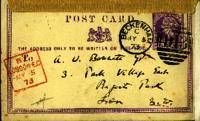
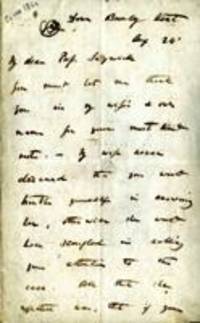
![Letter from [Charles Darwin] to Alfred Neafie](https://digital.case.edu/sites/default/files/styles/islandora_imagecache_image_style_medium/public/externals/d6a3276636869570f54cf08dd5c182ef.jpg?itok=BA9YF4X7&pid=ksl:ditalldar00119&iic=true)
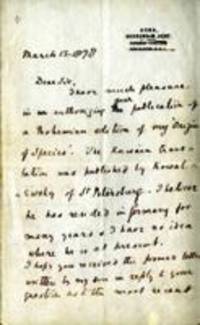
![Letter from Charles Darwin to [Bibliogr. Inst. Leipzig], 10583](https://digital.case.edu/sites/default/files/styles/islandora_imagecache_image_style_medium/public/externals/3620819c5aff45ceb336aad3030f31b4.jpg?itok=WPyw9TN-&pid=ksl:ditalldar00182&iic=true)
![Letter from Charles Darwin to [C. S. Bate], 1471](https://digital.case.edu/sites/default/files/styles/islandora_imagecache_image_style_medium/public/externals/687641b2e3da7458b574c4be9e79ca48.jpg?itok=qLs5E7hM&pid=ksl:ditalldar00180&iic=true)
![Letter from Charles Darwin to C. W. Crocker [Charles William Crocker], 3425](https://digital.case.edu/sites/default/files/styles/islandora_imagecache_image_style_medium/public/externals/15756a59410eeeee2cc5c4020996698a.jpg?itok=KsZ2CxuU&pid=ksl:ditalldar00192&iic=true)
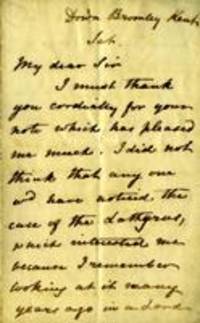
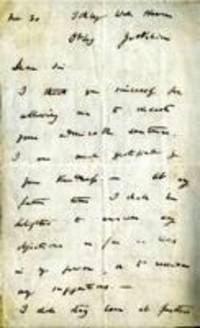
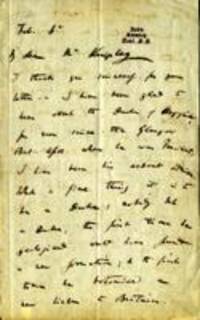
![Letter from Charles Darwin to D. F. [Dorothy Fanny] Nevill, 12933](https://digital.case.edu/sites/default/files/styles/islandora_imagecache_image_style_medium/public/externals/59924393941e6514a2fc925f36dab7a7.jpg?itok=VWk48ZlU&pid=ksl:ditalldar00211&iic=true)
![Letter from Charles Darwin to D. F. [Dorothy Fanny] Nevill, 9632](https://digital.case.edu/sites/default/files/styles/islandora_imagecache_image_style_medium/public/externals/3ce7b96066ef2ac6177ab53780cd006b.jpg?itok=GzBwucoU&pid=ksl:ditalldar00213&iic=true)
![Letter from Charles Darwin to D. F. [Dorothy Fanny] Nevill, 9915](https://digital.case.edu/sites/default/files/styles/islandora_imagecache_image_style_medium/public/externals/7209451e4a21f1490449bdcc1bed0413.jpg?itok=59P-HCsH&pid=ksl:ditalldar00212&iic=true)
![Letter from Charles Darwin to D. F. Nevill [Dorothy Fanny Nevill], 10789](https://digital.case.edu/sites/default/files/styles/islandora_imagecache_image_style_medium/public/externals/56f6d082911e3ed7cb4b3c490c61c214.jpg?itok=Ga6HihQU&pid=ksl:ditalldar00218&iic=true)
![Letter from Charles Darwin to D. F. Nevill [Dorothy Fanny Nevill], 3324](https://digital.case.edu/sites/default/files/styles/islandora_imagecache_image_style_medium/public/externals/5259aa7972f55284283bb608d9ae0956.jpg?itok=7TYGyovE&pid=ksl:ditalldar00219&iic=true)
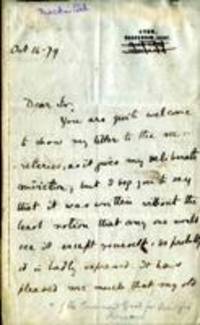
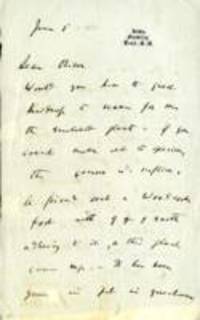
![Letter from Charles Darwin to D.F. Nevill [Dorothy Fanny Nevill], 9634](https://digital.case.edu/sites/default/files/styles/islandora_imagecache_image_style_medium/public/externals/28e56ed8868149a0c82e9f56fb4be8cb.jpg?itok=6rzM2xNA&pid=ksl:ditalldar00215&iic=true)
![Letter from Charles Darwin to D.F. Nevill [Dorothy Fanny Nevill], 9644](https://digital.case.edu/sites/default/files/styles/islandora_imagecache_image_style_medium/public/externals/da148f09bf54c06728a06281ad137fcb.jpg?itok=XY11qsLZ&pid=ksl:ditalldar00216&iic=true)
